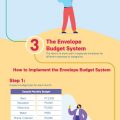Are you looking to take control of your financial future, make more informed spending decisions, and achieve your long-term financial goals? The journey toward financial stability and success begins with understanding the art of smarter spending and better budgeting. In a world filled with financial choices, navigating the path to financial well-being can seem daunting. However, you may develop the confidence to manage your money well if you have the appropriate information and techniques. This thorough guide is intended to give you insightful information and helpful pointers to aid you on your journey.

Understanding Your Financial Situation
To gain financial stability and work towards achieving your goals, it’s crucial to comprehend your current financial situation thoroughly. This involves comprehensively assessing your income sources, monthly expenses, and any outstanding debts. By taking a closer look at your finances, you can pinpoint areas where you might be overspending and identify opportunities to save. Additionally, defining clear and achievable financial objectives is pivotal in your financial journey. Whether it’s saving for retirement, purchasing a home, or paying off student loans, setting specific goals will serve as your guiding light throughout the budgeting and financial planning process.
Budgeting in a Realistic Manner
Building a sensible budget is the basis for your long-term financial security. It begins with understanding the fundamental principles of budgeting, where you allocate your income to meet your financial obligations and achieve your goals. Your basic necessities are met by giving priority to expenses like housing, utilities, and groceries. Beyond that, saving money and building an emergency fund offer a safety net against unforeseen costs. A well-structured budget not only helps you manage your day-to-day spending but also paves the way for financial success by helping you allocate resources effectively and work towards your long-term financial aspirations.
Tracking Your Spending Habits
Monitoring and analyzing your spending habits is fundamental to prudent financial management. It empowers you to gain insight into where your money goes, allowing you to make informed decisions. Employing budgeting tools or apps simplifies the process by automatically categorizing expenses and providing clear visualizations of your spending patterns. You can spot potential areas of overspending or chances for cost-cutting by regularly evaluating these insights. This proactive approach to tracking spending not only helps you stay on course with your budget but also enhances your financial awareness, enabling smarter financial choices and ultimately leading you closer to your financial goals.
Making Informed Financial Choices
Making informed financial choices is a pivotal aspect of managing your finances effectively. It hinges on distinguishing between needs and wants, ensuring that essential expenses are prioritized while discretionary spending is carefully considered. By aligning your spending decisions with your financial goals, you can allocate resources more judiciously and avoid impulsive purchases. Evaluating the long-term impact of each financial choice is crucial in maintaining fiscal responsibility. This deliberate approach not only supports your budgeting efforts but also contributes to your overall financial well-being, putting you on a path toward achieving your financial objectives.
Building a Solid Savings Strategy
Building a solid savings strategy is pivotal for financial security, and it’s advisable to seek guidance from a trusted financial advisor to make informed decisions. For example, if you live in AZ, you might look for Arizona financial planners to help you out. This expert insight can help you set achievable savings goals, whether it’s for retirement, a major purchase, or an emergency fund. A financial planner can provide valuable advice on allocating your savings to appropriate investment options, ensuring that your money works efficiently to meet your objectives. Collaborating with a financial planner can enhance the effectiveness of your savings strategy, helping you navigate the complexities of financial planning with confidence and a clear path toward your financial goals.
Staying on Course and Adapting
Staying on course and adapting is essential in the realm of financial management. It’s wise to evaluate and modify your budget on a regular basis because it will help you stay on track with your financial objectives and account for any changes in your situation. Unexpected expenses are inevitable, and a well-structured budget can help you handle them without derailing your financial progress. Additionally, it’s crucial to celebrate your financial milestones and progress, reinforcing your commitment to sound financial habits. By embracing a flexible and adaptive approach, you can navigate the twists and turns of your financial journey, ensuring long-term financial stability and the realization of your financial aspirations.
Conclusion
Keep in mind that achieving financial security needs perseverance and adaptability. Keep tabs on your spending patterns, make any budget adjustments, and keep your eye on the prize. Whether you’re aiming for a debt-free life, planning for a comfortable retirement, or simply striving for greater financial peace of mind, the principles outlined in this guide will remain your steadfast companions. With a clear budget, informed financial choices, and the guidance of trusted advisors, you are well-equipped to build a solid financial foundation and realize your financial aspirations. Your financial journey is yours; embrace it with confidence and determination.






